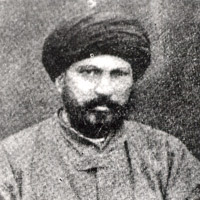One of the most influential Muslims with towering personality and sparkling ideology, Sayyed Jamaluddin Afghani was the harbinger of Muslim Renaissance in the 19th century. He was the principal figure in awakening Islamic political sentiments and social reforms in India, Persia, Afghanistan, Egypt and the Ottoman Empire. He was an intellectual, a versatile genius, a wandering missionary, an impressive interpreter of the Holy Quran and an orator of the highest caliber who brought about a universal awakening throughout the world of Islam. He moved about in the capitals of Muslim countries — lecturing, discussing and writing about his mission, leaving behind him a band of zealous workers or his disciples who continued his work even after his death. Several movements of religious revival and social reform owe their origin to this singular personality.
Syed Jamaluddin was born in 1838. He was Afghani because of his place of birth at Asadabad in Afghanistan. He was Syed due to his family lineage that traced back to Imam Hussain. His father Syed Safdar, a descendent of Syed Ali Al-Tirmizi, had a command over wide range of subject, while his mother Sakina begum was a religious lady. Even at the early age of eight years, Jamaluddin exhibited extraordinary intelligence. Before he was 18, he was well versed in almost all the branches of Islamic learning in addition to philosophy, jurisprudence, history, metaphysics, mathematics, medicine, general sciences, mysticism, astronomy and astrology. His learning was encyclopedic and his genius was versatile. Journey proved to be his best coach. His ceaseless journey around the globe and revolutionary spirit enabled Jamaluddin Afghani to study the socio-political problems of the Muslims and ignite the spirit of Muslim fraternity and unity against the western domination.
He started his journey from Iran and came to India in 1856, at the age of eighteen. He spent a year in Delhi and felt the political surge of the subcontinent that was soon to erupt in the Sepoy Uprising of 1857 in which the Indians tried their utmost to throw off the alien yoke. From India, Syed Jamaluddin visited Arabia to perform Hajj and returned to Afghanistan in 1858. He was employed by Amir Dost Muhammed. His talents propelled him to the forefront of the Afghan hierarchy. After the death of Dost Muhammed when his brother Mohammed Azam became the Amir, he appointed Jamaluddin as his prime minister. In 1869, Jamaluddin fell out of favor with the Amir and left Kabul for India. In Delhi, he received the red carpet treatment from British officials, who were at the same time careful not to let him meet the principal Indian Muslim leaders. The same year he visited Cairo on his way to Istanbul where his fame had preceded him. He was elected to the Turkish Academy and got the membership of Danish Usmania organization. Since his speeches on the burning issue of that age and rational interpretation of the Quran and the Sunnah were disapproved by the Turkish ulama, he was expelled from Istanbul in 1871. However, during his stay in Turkey, he remained very popular with many young Turks and intellectuals who came under his influence. From Turkey he reached Cairo where he came into contact with the professors and students of Al-Azhar, who were immensely impressed by his deep erudition and high scholarship. He left an abiding impression of his progressive ideas on the intelligentsia of Egypt which, later appeared in the person of Muhammad Abduh. Jamaluddin had a major role in the events that led to the overthrow of Khedive Ismail Pasha who had brought Egypt to its knees through his extravagance. European influence increased, and Jamaluddin was at the head of the Young Egyptian Movement and the nationalist uprising under Torabi Pasha (1881) that sought to expel the Europeans from Egypt. Due to suspicion of Britain and France the government of Egypt ordered him to leave Cairo immediately. After a stay of about eight years in Egypt, Jamaludin Afghani left Cairo in March, 1879, and arrived in Hyderabad Deccan (India). Here he wrote his famous treatise, “Refutation of the Materialists”, which created a stir in the materialistic world. He also started a magazine that propagated his anti-western thought but due to the war between Egypt and Britain, he was kept for the most time under house arrest. In India too he inspired so many young Indian Muslims like Sir Salar Jang Bahadur and Syed Hussain Bilgrami who wanted an end of British Raj in India. From India, Jamaluddin embarked on a journey through Europe and resided for many years in London, Paris and St. Petersburg. He met the English author and the political leader Wilfrid Scawen Blunt who became his lifelong friend. During In Paris he met his old friend Muhammed Abduh who had been exiled from Egypt. The two outstanding celebrities of the Muslim World started their famous Arabic Journal “Al Urwat-ul-Wuthqa”, from Paris, It was an anti-British organ, whose scathing criticism and fiery articles created a furore in the imperialist circles and its entry was banned in India. Its expositions of the imperialist designs in the Muslim east terrified the western imperialists who viewed with alarm its growing popularity in the Arabic speaking world. Through his friend Blunt he had talk with Randolph Churchill and did his best to influence him. In St. Petersburg, he met Shah Nasiruddin Qaisar, the ruler of Persia. A little later, the Shah met Jamaluddin Jamaluddin in Munich, Germany, for the second time. He was so much impressed with his dynamic personality that he offered him the exalted position of premiership of Persia. Jamaluddin hesitated, but yielded due to extreme persuasion of the Shah and arrived in Persia along with the Shah. But his growing esteem and popularity among the intelligentsia and Persian masses created apprehension and jealousy in the mind of the ruler. Being a sensitive person, Jamaluddin smelled this apprehension and sought permission to leave the country. But he was not allowed to do so. Now there was hardly any course left to him. He openly criticized Shah Nasiruddin Qaisar and his reign of terror. He was arrested and deported from Persia. But the fire, which he had kindled in Persia, culminated in the assassination of the Shah on May 1, 1895.
Later he came to Iran but was expelled from Iran. He went to Moscow, in the hope to get an alliance of the Czar against British Imperialism. It was through his influence that the Muslims in Russia were permitted to print the Holy Quran and other religious books, whose publication was earlier banned in Czarist Russia.
Then Syed arrived once again in Istanbul to fulfill his dreams of Pan Islamism. He was warmly received by Sultan Abdul Hamid II who also nourished the ideas of uniting Muslims of the world. But death visited him on March 8, 1897, and his dreams of independent united Muslim world did not come true in his life. The main goal of Syed Jamaluddin Afghani was to unite the Islamic world under a single caliph resident in Istanbul. Towards this end, he sought a rapprochement between the Ottoman Empire and Persia, working to have the Shah recognize the Ottoman Sultan as the Caliph of all Muslims, while the Caliph recognized the Shah as the sovereign of all Shi’as. He wrote to the leading theologians of Karbala, Tabriz and Tehran, passionately arguing his case and was partially successful in bringing them to his point of view. However, the rapprochement did not take place due to the political turbulence in Persia. Secondly, he sought to revive Islam to make it responsive, as he saw it, to the needs of the age.
As a man, Jamaluddin was humble, courteous, hard working and amicable. He slept little, working for more than 18 hours a day. He received those who came to visit him with great courtesy. About Jamaluddin, Edward G. Browne, author of the well known work, A Literary History of Persia writes: “the humblest as much as the most distinguished, but was very chary of paying visits, especially to persons of high ranks, In speech, he was eloquent, always expressing himself in choice language, and avoiding colloquial and vulgar idioms, but carefully adopting his words to the capacity of his hearers. As a public speaker he had hardly a rival in the east.” Regarding his other qualities Browne states: `He was abstemious in his life, caring little for the things of this world, bold and fearless in face of danger, frank and genial but hot tempered, affable towards all but independent in his dealings with the great. His intellectual powers and his quick insight and discernment were equally remarkable so that he seemed able to read men’s thoughts before they had spoken.’ About his versatility Browne writes: “His knowledge was extensive, and he was specially versed in ancient philosophy, the philosophy of history, the history and civilization of Islam. He learnt French in three months without a master, sufficiently well to read and translate…He knew the Arabic, Turkish, Persian and Afghani languages together with a little English and Russian. He was a voracious reader of Arabic and Persian books. He appears never to have married, and was indifferent to female charms.” “It was really wonderful”, writes Browne, “that a wandering scholar, with no material resources save only an eloquent tongue and a pen, literally made kings tremble on their thrones and defeated the well-laid plans of statesmen by setting in motion forces which he knew how to evoke and with which secular politicians, both European and Asiatic, had utterly failed to reckon.” Another great thinker of the East, Dr Iqbal, pays glowing tributes to Jamaluddin Afghani when he says: “A perfect master of nearly all the Muslim languages of the world and endowed with the most winning eloquence, his restless soul migrated from one Muslim country to another, influencing some of the most prominent men in Iran, Egypt and Turkey. Some of the greatest theologians of our time, such as Mufti Muhammad Abduh of Egypt, were his disciples. He wrote little, spoke much and thereby transformed into miniature Jamaluddins all those who came into contact with him…He never claimed to be a prophet or a renewer; yet no man in our time has stirred the soul of Islam more deeply than him. His spirit is still working in the world of Islam and no one knows where it will end.”
This article was last updated on Wednesday, Jan 04, 2006



